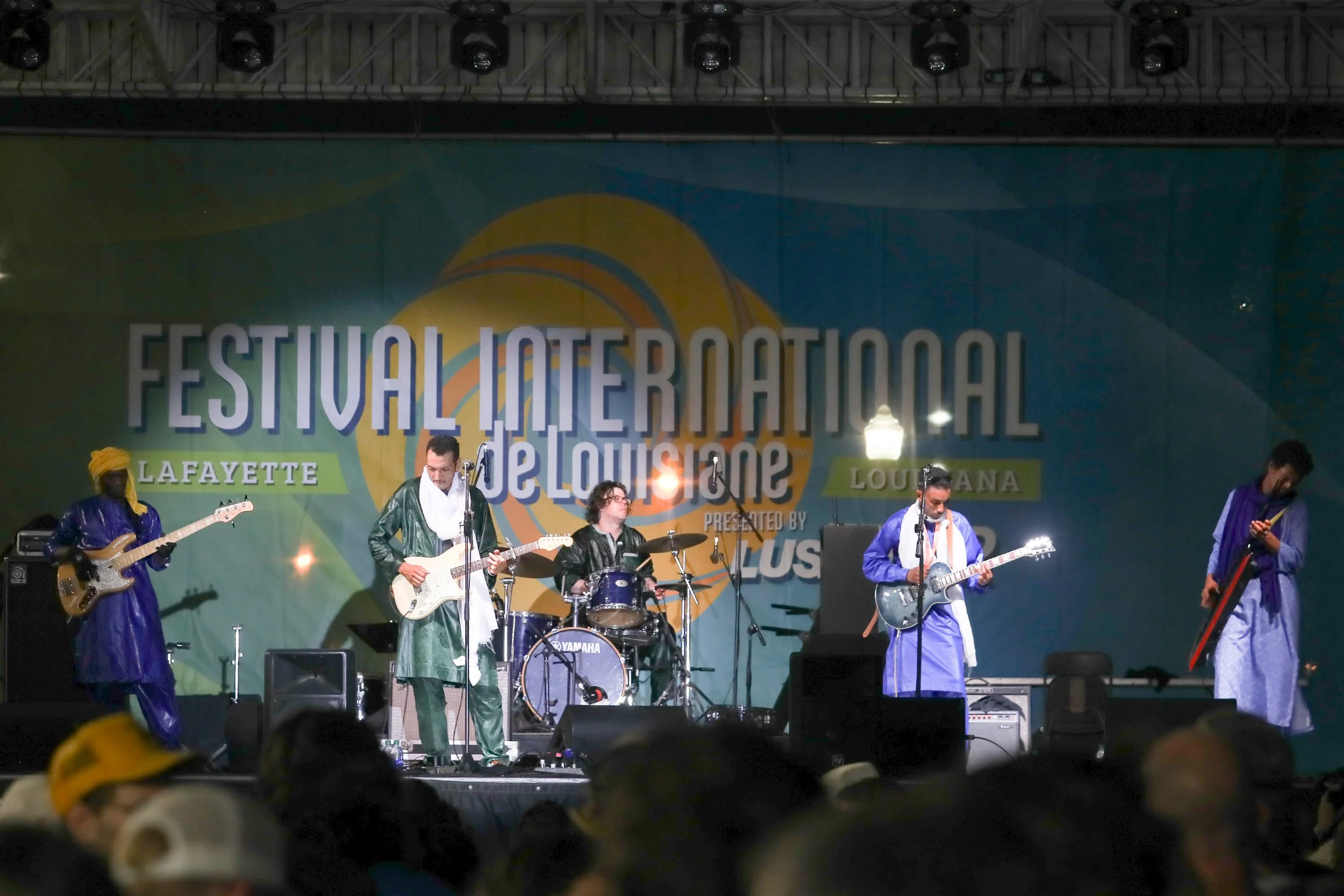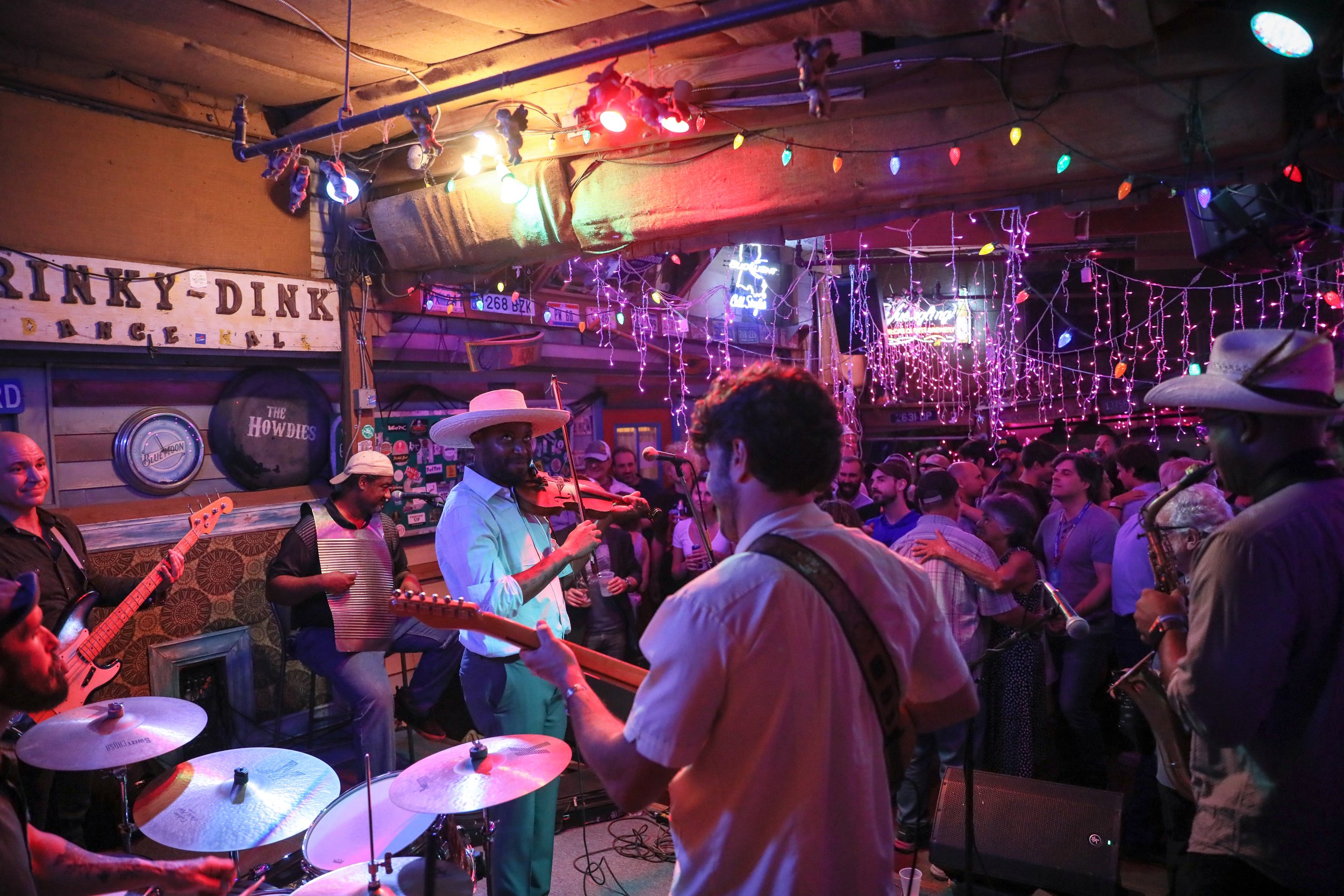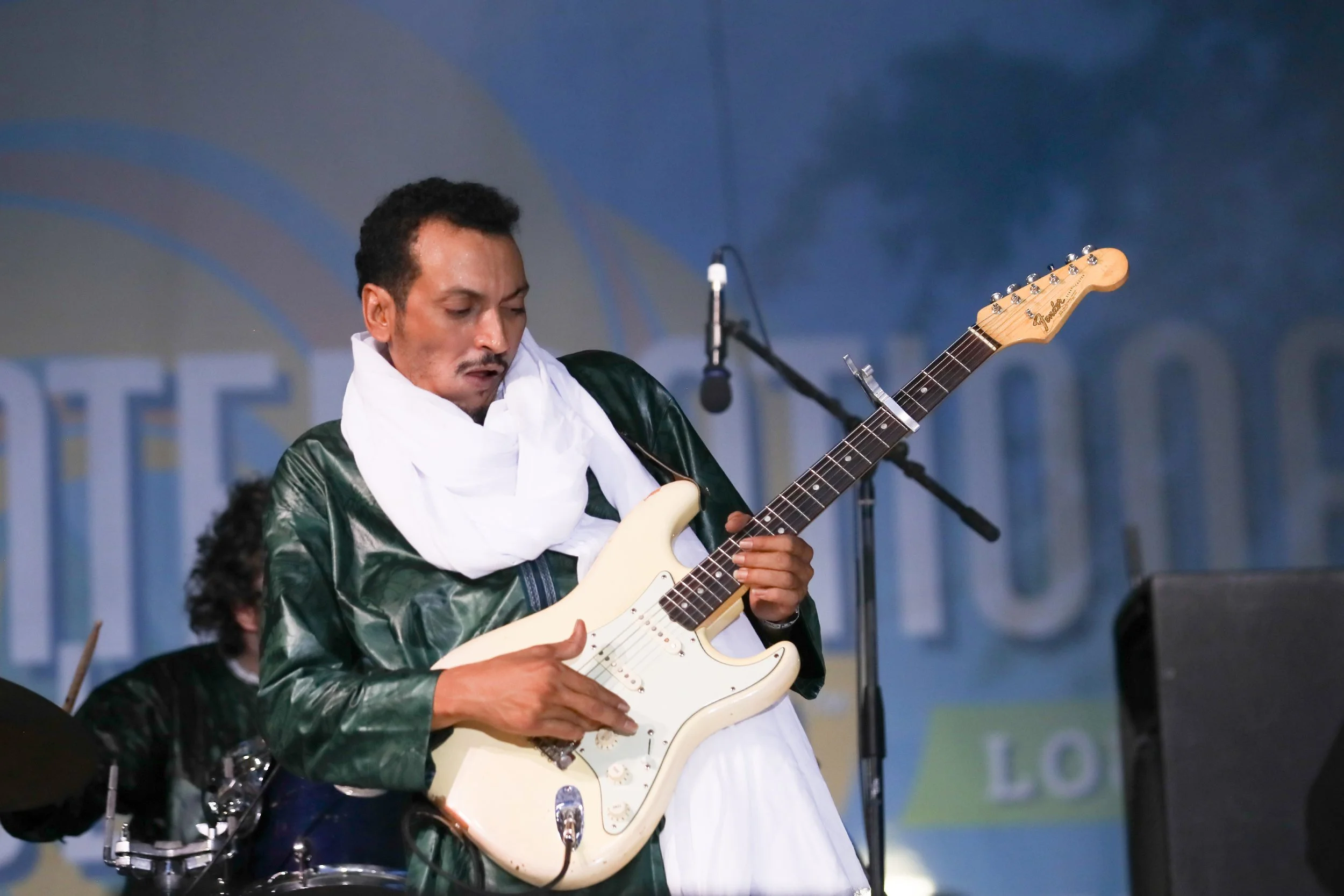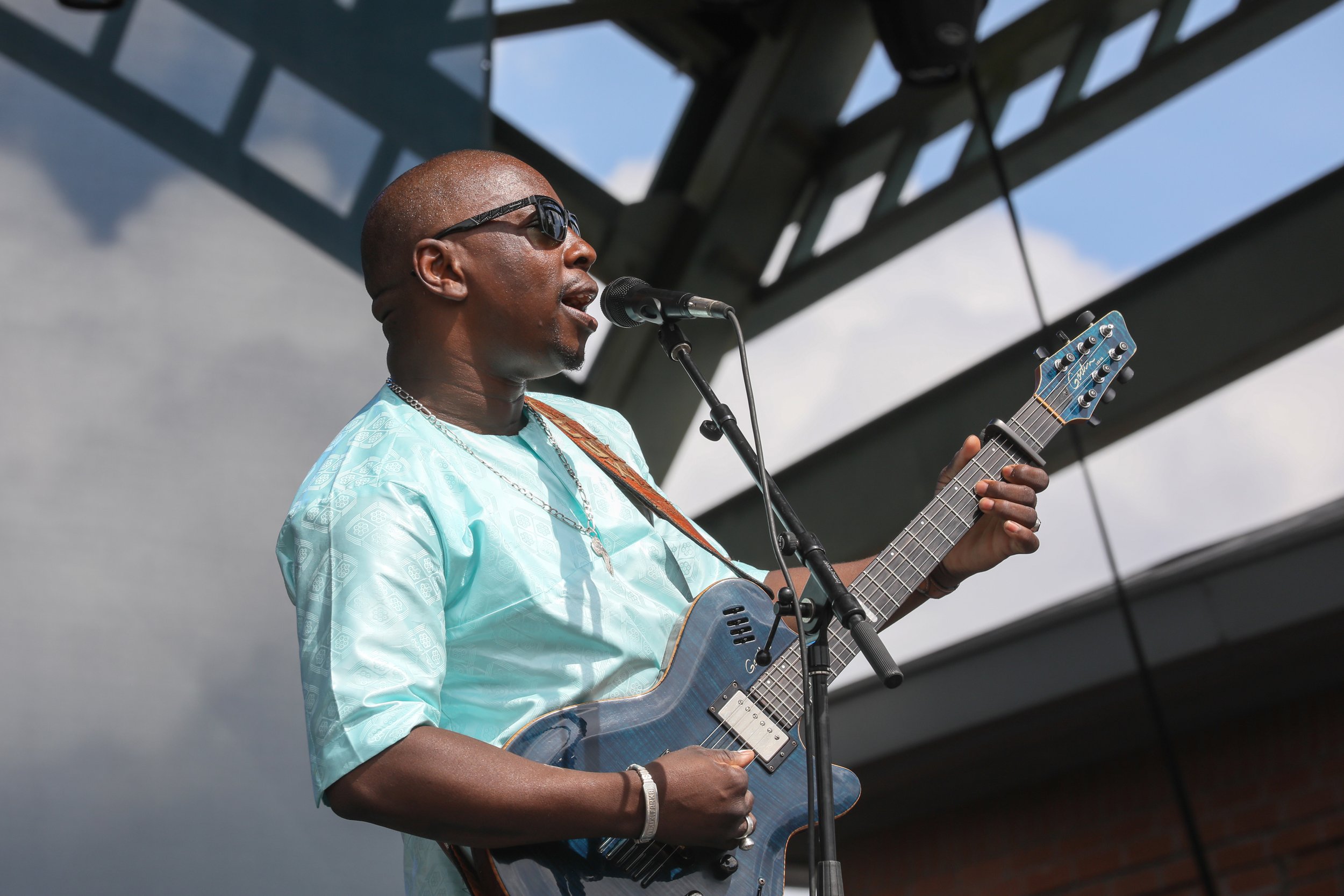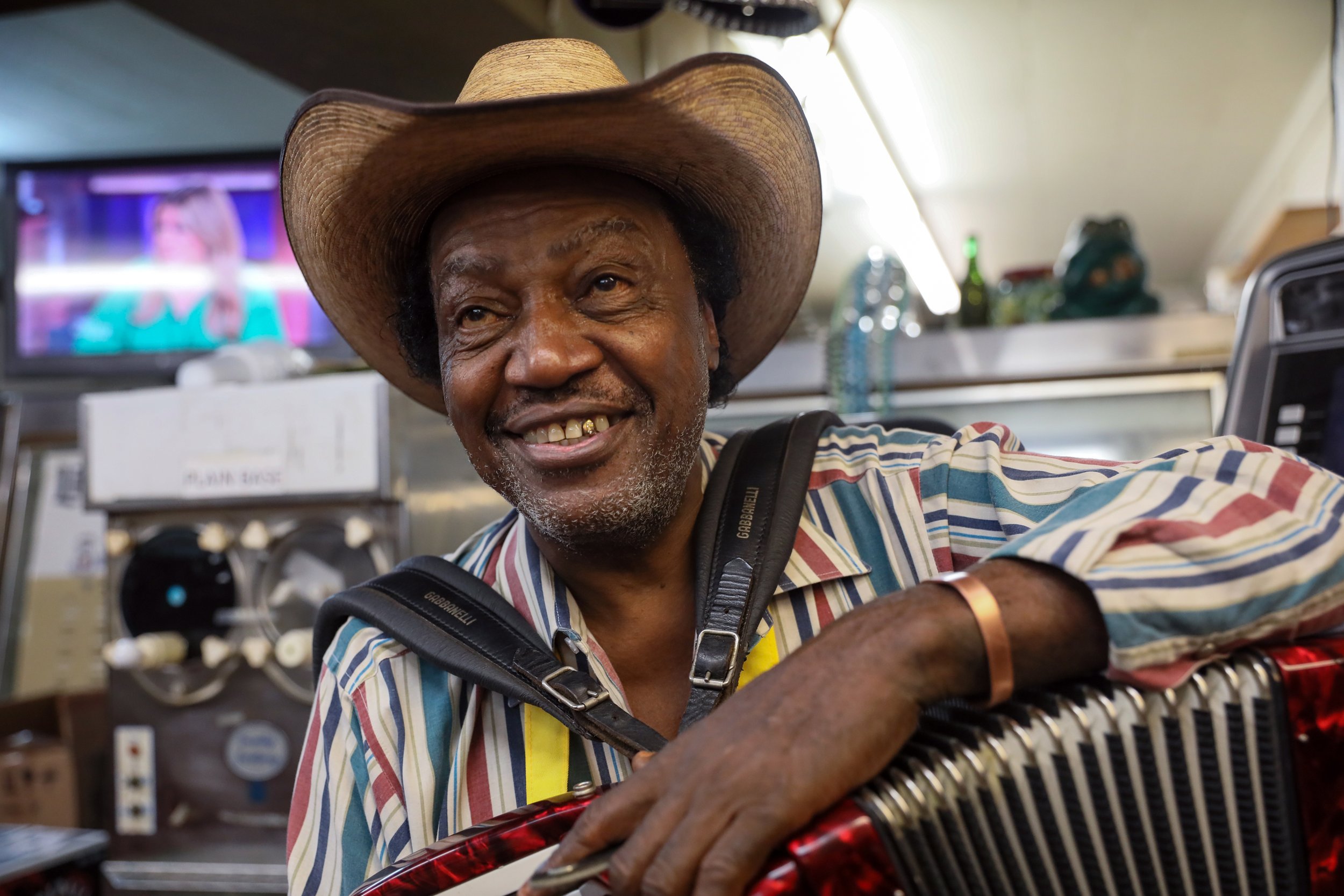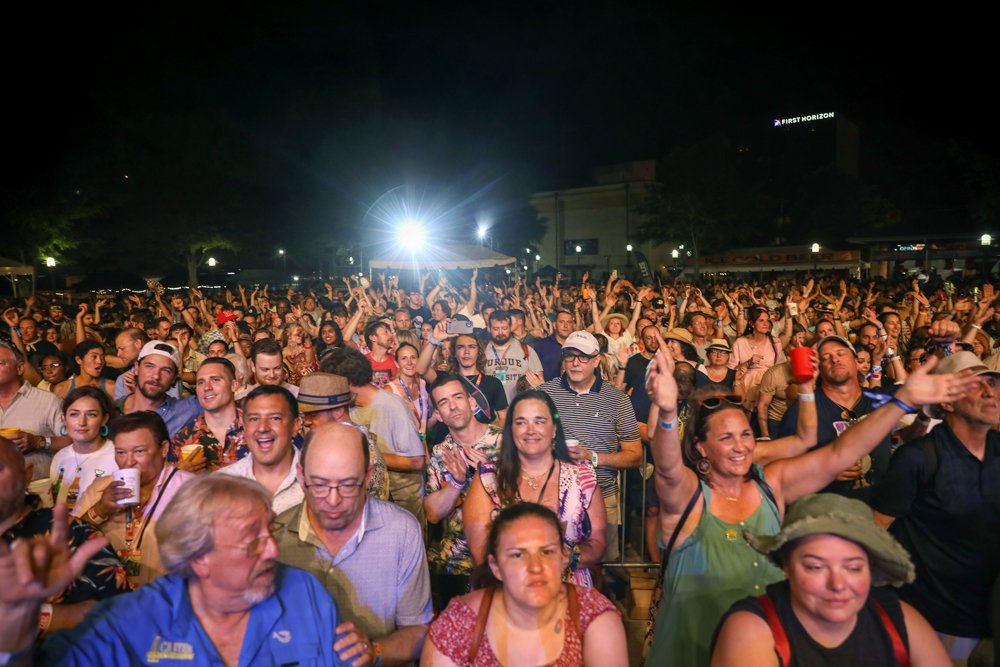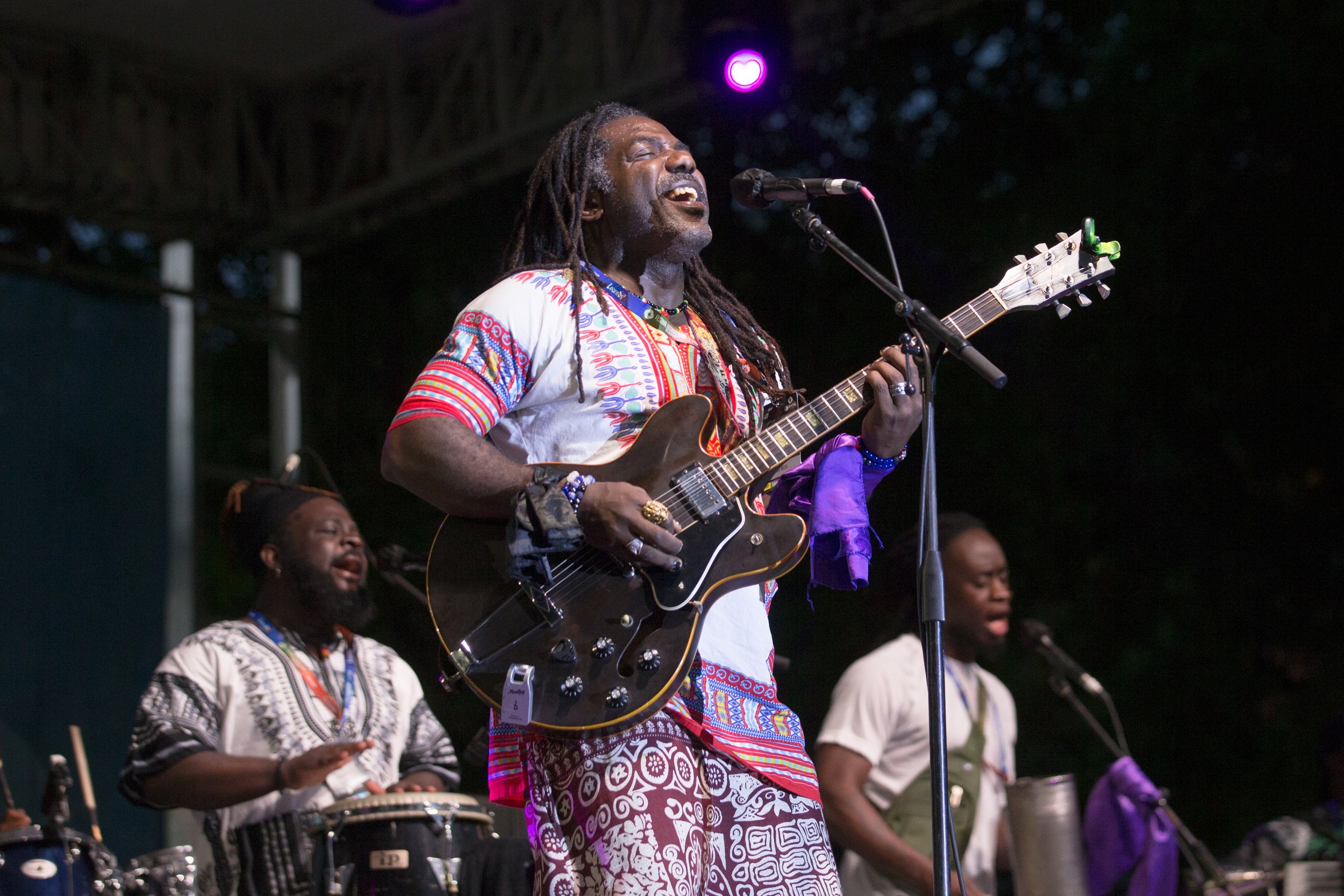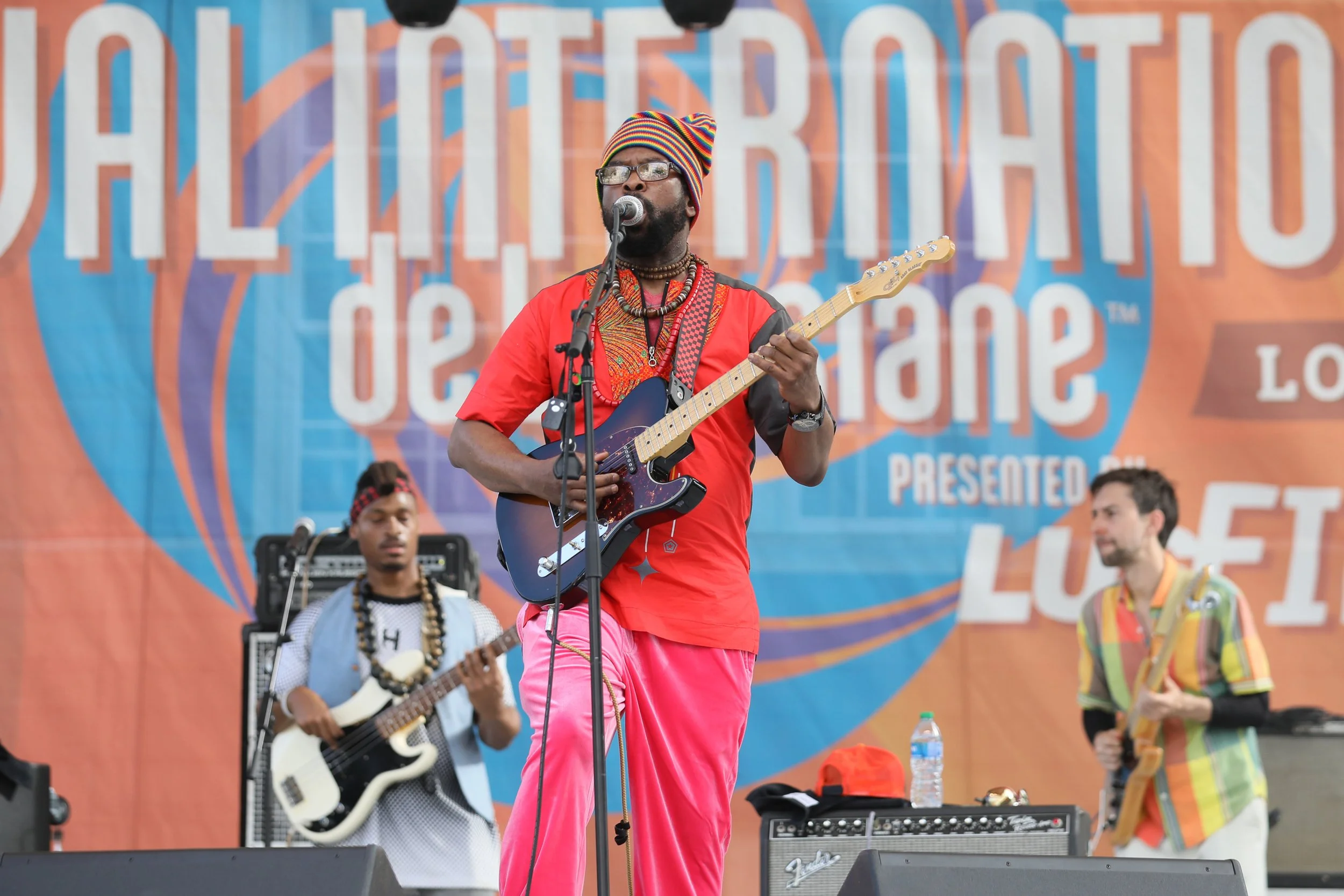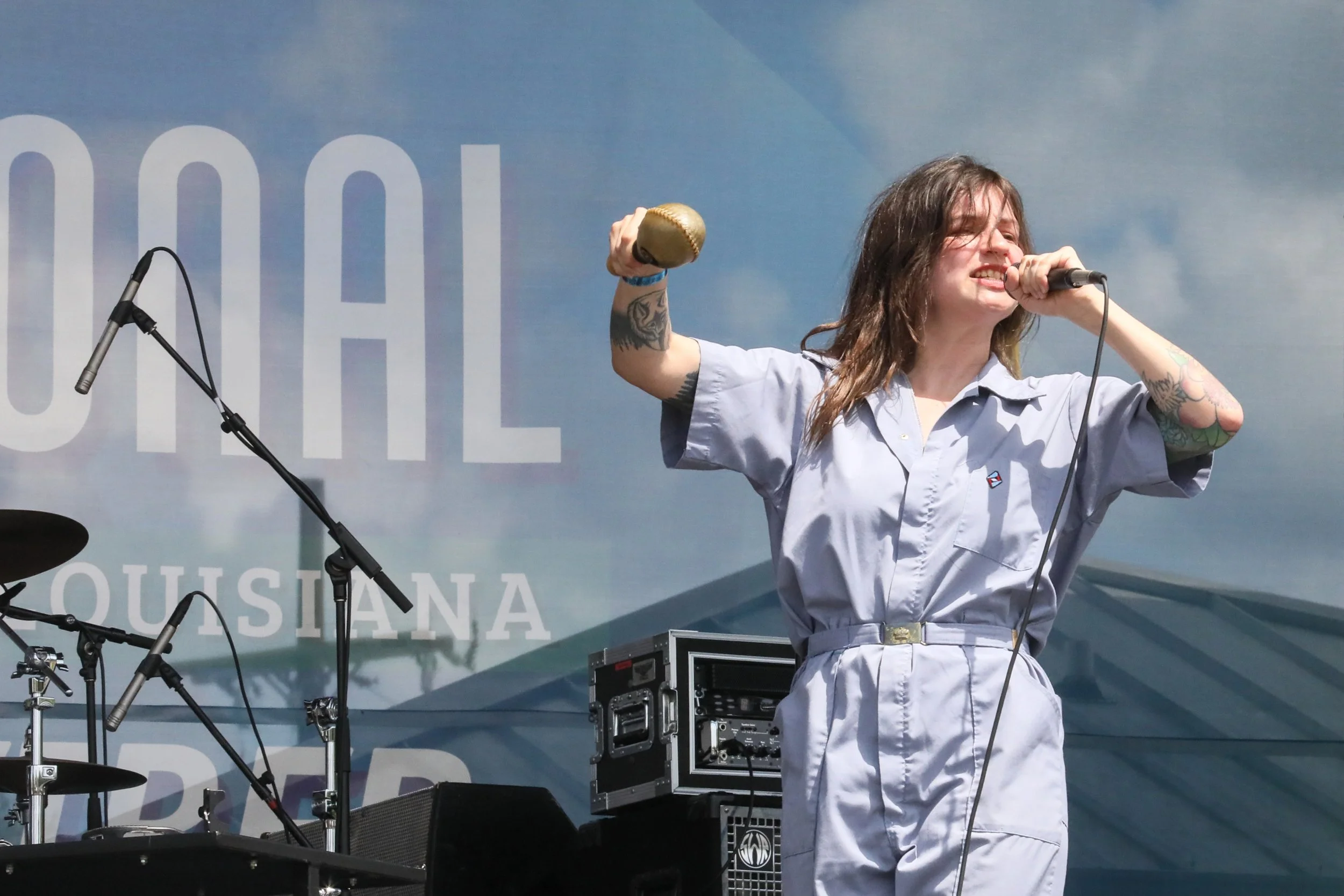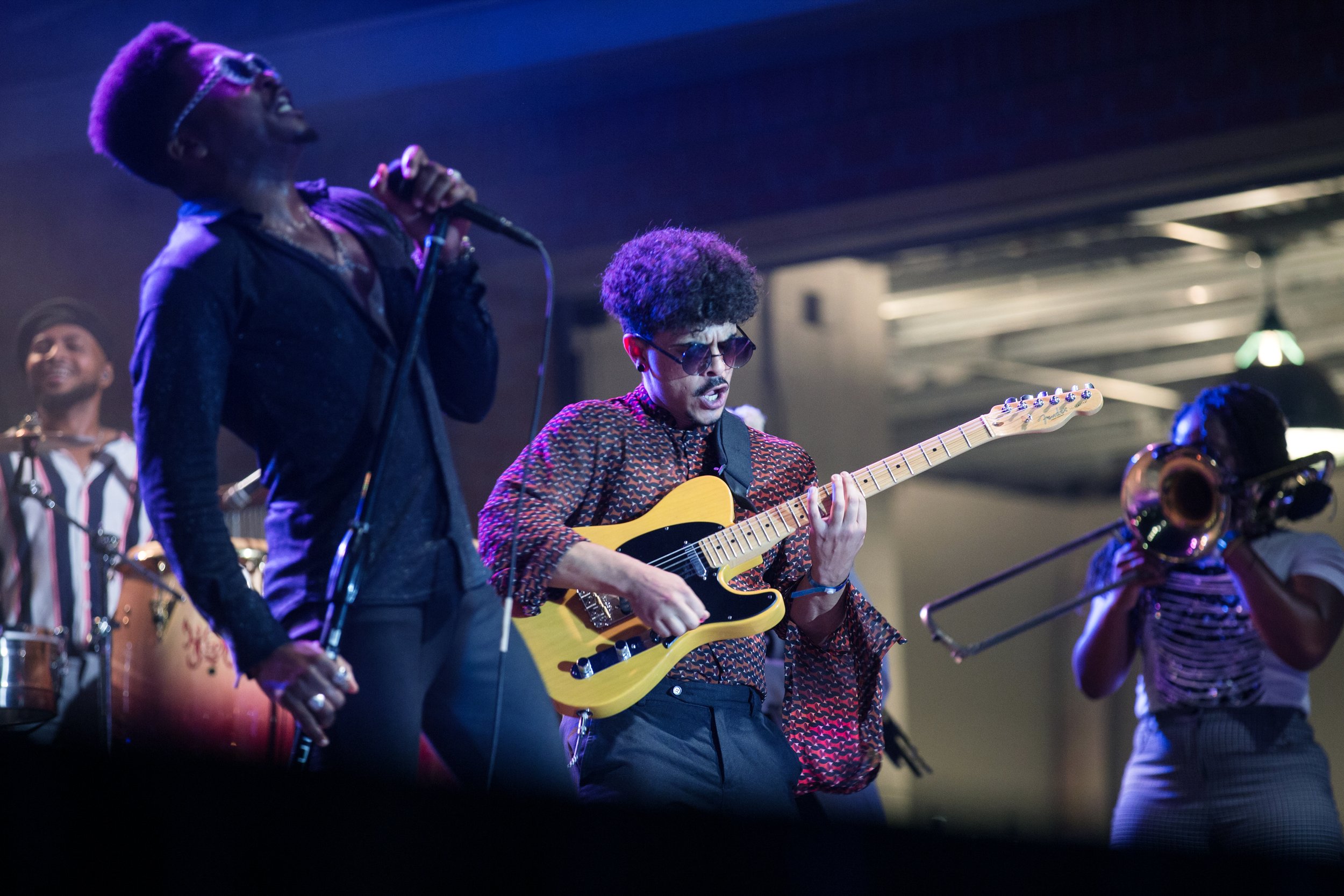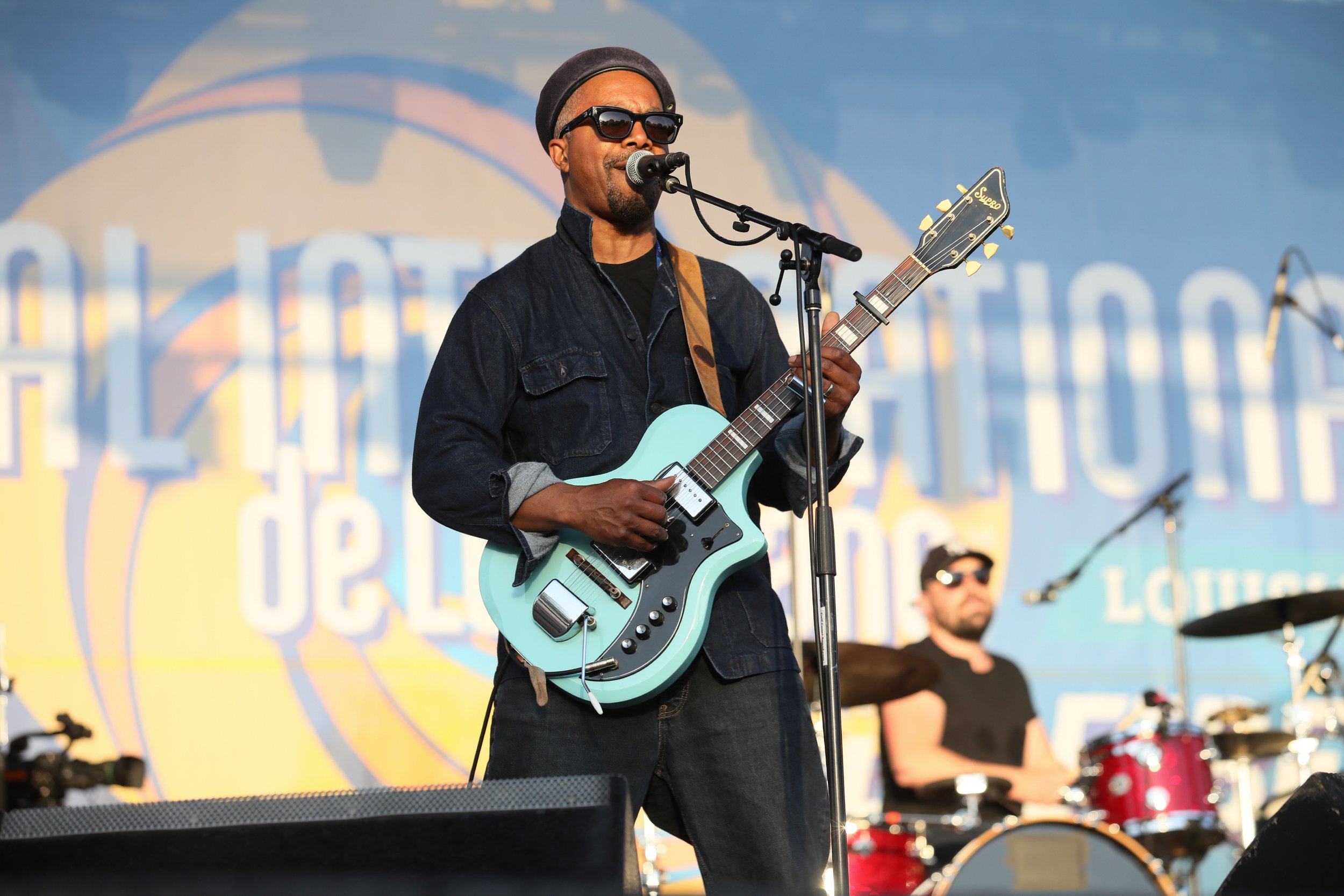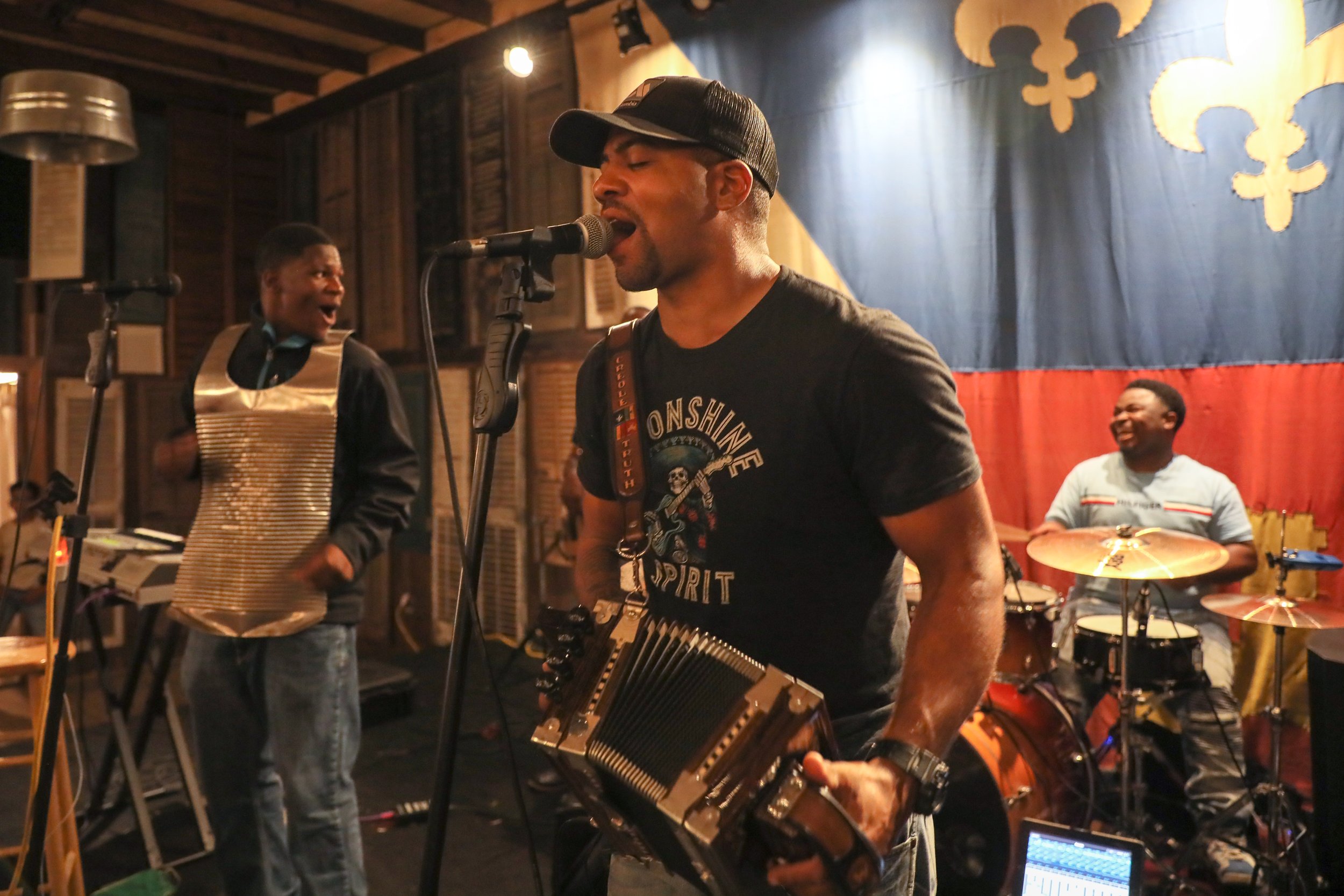Festival International de Louisiane 2022
Cedric Watson and Bijou Creole performing at the Blue Moon Saloon in Lafayette La, opening night of the Festival International de Louisiane
Live music is back on Festival International de Louisiane stages after a two year hiatus. The Blue Moon Saloon was our first stop in Lafayette after arriving on a 10pm flight Thursday evening. It was refreshing to feel the energy and excitement of live performance and to see the local venues full after a few years of tumult.
Bombino performing on the Tito’s LFT stage at Festival International de Louisiane in Lafayette Louisiana.
Others obviously felt the same. Couples were swinging on the dance floor to La Patente, a quartet from New Brunswick. Next, headliner Cedric Watson and Bijou Creole followed with a set equally mixed between blues, dance music and select original compositions. The sound was direct and unfiltered, led by tasty accordion hooks and cajun fiddle songs with Paul “Bird” Edwards on washboard, Daniel Coolik, guitar and rhythm section Philippe Billeaudeaux bass, and Adam Cormier drums.
Cedric Watson and Bijou Creole (Paul Bird Edwards, Daniel Coolik, Phillip Billeaudeaux and Adam Cormier) at the Blue Moon Cafe
Music is being redefined as tradition is respected in the Acadian region, compare the approaches of Bijoux Creole and the Lost Bayou Ramblers, very different but equally compelling.
Video medley from the Lost Bayou Ramblers set at the Blue Moon Saloon in Lafayette April 29th, 2022
The Lost Bayou Ramblers sound is complex, honed over 20 years of performing together, efforts rewarded in 2017 with a Best regional Roots Grammy for the album “Kalenda”. Bryan Webre (bass, ROland SP_606) and Kirkland Middleton, Drums lay the foundation and the thick rhythmic roar of Johnny Campos’ guitar create a space for the brothers Michot, Andre on accordion and lap steel and Louis vocals and fiddle to meld into. Saturday night, a palpable sense of pent-up energy filled in the room as the band walked on stage. Their shows are legendary, and there is nothing like seeing them play for a hometown audience. In fact, the last time we saw them was on this stage in 2017 when they were joined by Lakou Mizik in an epic performance forever etched in our memories. Their musical journey began at a young age hearing Cajun music of their father and uncles and later performing with the family band Les Freres Michot. Louis describes the music “We have been honing in on how to make Cajun music our own, still honoring the tradition while still being able to bring in our own outside influences and other band members influences. It’s all about diversity and staying happy.”
The Gama Brothers of Son Rompe Pera follow a similar musical path. Their knowledge of the marimba and the folk music it is associated with was instilled as youths. They began performing with their father at parties and in the streets of their town, Naucalpan, Mexico. The marimba as the lead instrument was primarily limited to folk traditions until Son Rompe Para flipped preconceptions by introducing it into the Mexico City punk scene. Jesús Ángel and Allan Gama (Kacho and Mongo) play the instrument together, one on rhythm and the other playing leads which tended to be very melodic with ferocious energy.
Natu Camara ignited Laborde Earls stage with her energetic and very unique blend of West African rock and soul. Many of the festival’s African performers had a sound associated with a particular region, however when you listen to Natu’s music, it feels more universal in appeal than more traditional performers. Her blend of rock, soul and singer-songwriter tunes are infused with rhythms from Guinea, Mali and West Africa more generally. The stories she tells are personal ones that invite listeners in her experiences. The result is Natu builds a unique bond with her audience, and transports them into her world. Commentary includes the struggles of personal loss, the challenge of finding herself along in a strange city. Natu Camara is full or originality and musical ideas, and performed several songs from her upcoming album, the most notable transported listeners back to her youth while pending time with grandmother in her village, Palatable in the new songs is the sense longing, of distance and time from this world traveler.
Les Filles de Illighadad members Amaria Mamadalher on water drum and Fatou Seidi Ghali, guitar.
As we approached the stage, the Tuareg band Les Filles de Illighadad (Amaria Mamadalher, Fatou Seidi Ghali, Alamnou Akrouni, with Abdoulaye Madassane) transported us to a near trance. The long and looping, dry and distorted electric guitar grooves swirled around us, accompanying prodding percussion. The two intertwining guitars looped with repetition, creating a droning effect, while percussion provided a steady metronome, slow and pounding. On closer examination, the thumping sound came from a calabash gourd, half buried in water, inside a plastic washtub - an unique and unwavering rhythm. On top of this, we were drawn in further by alternating high pitched vocals, first from stage right, then from stage left, and back again. The vocal call and response swirled with stereo imagery. The music is played is called Tende, traditional music of the Toureg people of the Sahel region of North Africa. The spare instrumentation hints at the nomadic lifestyle. The tende is made from goat skin stretched over over a mortar, the water drum used is an overturned calabach in a washtub of water. The guitar is a recent innovation incorporated into the music.
Bombino on the Tito’s LFT stage
There was a stark contrast between the hypnotic performance of Les Filles de Illighadad and the energetic guitar flourishes by Tuareg rocker Bombino, who is also from Niger. The former band locked us into a trance, where-as Bombino had us following his guitar solos. The energy level was at a peak and Bombino had the crowd enthralled - each song showcased his superb lead guitar riffs and the band, locked into a groove, provided a rock solid backing for the most energetic performance thus far.
Vieux Farka Toure, Malian guitarist and son of Ali Farka Toure performing on the LUS International Stage
Sid Williams owner of El Sid o’s Zydeco club at his business Sid’s One Stop
We left New York, with hopes it would be possible to speak with a legend in Zydeco music, Sid Williams whom we had read about. He is the owner of El Sido’s Zydeco Blues Club in Lafayette, a roadhouse where everyone who is anyone has performed. A phone call to his business Sids One Stop was all it took. Sid definitely wears more than one hat, we found him in the kitchen cooking a big pot of jambalaya when we arrived. He told us to come back and get it while its hot. While we ate we we could see that this was more than a convenince store, but a local gathering spot as a steady stream of people stopped in to say hello or make a request or just grab a drink but everyone greeted Sid warmly. In the midst of this, still wearing his apron, he found time to take out two his accordions and play some. “Clifton taught us all, showed us all” he said before playing a few bars of “I got a Litttle Girl” one of Clifton’s songs. All in the store stopped and listened. We also found out there is a documentary in the works SID WILLIAMS “A ZYDECO LEGEND” from Eric Breaux Productions Zydeco Kingdom Promotions. Photos of Sid and other zydeco greats were framed on the wall behing the register, Beau Jocque, Boo Zoo Chavis, Dennis Paul Williams, Nathan, CJ Chenier, Canray Fontent Bois Sec and Stanley “Buckwheat Zydeco” Dural who was the opening act at El SID O’s 40 years nearly ago.
Wayne Singleton & Same Ol’ Two Step! at FeednSeed in Lafayette, La
We also got to peak inside where it all happened. El Sido’s is a warm open space, the walls lined with photos and other memorabiliia collecte dover the years. It was silent but looked as if patrons had just pushed back their chairs after a Rockin Dopsie, John Delafose, or Beau Jocque performance. All played there at one time or another, the club which opened 37 years ago launched many artists. These days Sid is unable to compete with larger venues for the artists that went on to international stardom including his youngest brother Nathan Williams, and his Zydeco Cha Chas band and his nephew Lil’ Nate.
El Sid O’s Zydeco and Blues Club, 1523 N Saint Antoine St, Lafayette, LA
Festival International de Louisiane is unique in that it it opens itself to festival goers rather than enclosing them within fences. It takes place in Downtown Lafayette, where city blocks are closed off for the duration of the 5-day event now in its 36th year. In this region blessed with rich culture expressed in music, food, festival goers to able to sample local cuisine at restaurants and from restaurant vendor stands lining the streets, stroll through the open air artist and craft market or sample the craft of local brewers who also give scheduled talks about their product at a beer garden. With so much choices, each experience is unique.
Natu Camara performing at the LUS Fiber stage
While local musicians take center stage, Festival International also places local music within the context of world music. In 2022 International artists from Africa, the Caribbean, and North and South America were invited to perform, several we have spoken to told us of the instant connection felt when hearing zydeco, blues and cajun music.
Moving from stage to stage, listeners were ableto discover new juxtapositions between local music and music from the Francophone diaspora.
La Patente (Marc Colecchio, Mathieu Émond, Marc-André Godin and Chad Ritchie) from New Brunswick, Canada joined by Mike Chaisson on washboard performing at the Blue Moon Saloon in Lafayette Louisiana.
Lakou Mizik performs with a fervor that instantly transmitted to the audience, not that audiences in Lafayette needed prompting to move to the rhythm or vocally respond in chorus. It’s hard not to smile and dance tto the endless variety of rhythms that propel Haitian tradition-based music which is the foundation of Lakou’s music. Haitian music arrived in Louisiana centuries ago with Africans at the time of Independence also arriving with French fleeing the revolution and settling in Louisiana and can still be heard particularly in carnival rhythms. Steeve told us “when we got to NO, we thought it will be hard because we didn’t know the artists, but the connection was so tight because of the rhythm. They caught right up, I really get the vibe in NO, it feels like being home. Hopefully we will be able to play with some of the artists such as Leyla (McCalla).”
Lakou Mizik Festival International de Lousiane performance video montage
A memorable meeting was arranged by Festival International at the Blue Moon Saloon, an after-hours festival venue, in 2017. The Lost Bayou Ramblers were performing and Lakou Members walked through the audience carrying the Kone horns and percussion instruments. The musicians had never met, but Steeve knew what he heard at that moment. It was the nago rhythm found in the contradance music of Haiti. They joined the Cajun artists and the music continued uninterrupted. The drummer shifted from the contradance rhythm to a march as the band was introduced, and then segued into a rara rhythm, without a pause Lakou broke into a carnival chant bolstered by the kone (horns).
Lakou Mizik is Steeve Valcourt vocals and guitar, and Sanba Zao congas, James Carrier, conga and vocal with Kone, Joseph Ti Piti Peterson on Percussion, vocals and Kone, and Davius Vil on Drums, Belony Beniste on accordion, Lamarre Junior on bass
Steeve spoke about being back out on tour, the first tour since their album “Leave the Bones” was released in 2019. At that time their dates were cancelled due to the pandemic. “Leave the Bones” the blending music from all the albums together presented in new context adds an electronic element. “Leave the Bones” features acapella singing (African rhythms) over electronic beats on songs like “Iko Iko” and electronic vibe with the voudou rhythms on “Poze”, from their 1st album, and “Change” a mix of Voodou gospel, bringing together opposing ideology in one song. “Its the idea to change mentality.” He said.
79ers Gang from New Orleans featuring Jermaine Bossier (2L) and Romeo Bougere, center on vocals. and Jermaine Bossier
Changing perceptions is also the mission of The 79ers Gang, the project of Jermaine Bossier and Romeo Bougere. Both are New Orleans Mardi Gras Indian Chiefs of rival gangs, a collaboration unthinkable in prior generations. They performed a post-festival set at the Blue Moon Saloon. It included originals “79ers Bout to Blow” and “Stop the Water” from their latest album “Expect the Unexpected” as well as classic songs “Indian Red” “Ooh-Na-Nae”. 79ers also collaborate with Lakou Mizik on “Iko Kreyól” on the album.
The Super Yamba band members, who had played in a number of groups in Greensboro began casually exploring Afrobeat and the Afro funk music of Benin. They discovered the same, now vintage discs that Kaleta heard his older brother playing on the turntable. So, to some degree, the recordings of Orchestre Poly-Rythmo de Cotonou brought the band together decades later in New York. Formed in the late 1960’s Poly-Rythmo melded modern psychedelic innovations with traditional Vodun rhythms. The band’s funky, very tight orchestration stays true to that spirit on their first single “Mr Diva” and from their debut album "MÈDAHO”.
Bon Enfant lead singer and co-founder Daphné Brissette
Cimafunk
Delgres: Pascal Danaë - guitar, Baptiste Brondy - Drums, and Rafgee sousaphone
Delgres ia the project of French/Guadeloupean guitarist Pascal Danaë. In Paris, he collaborated with many artists from Africa, Richard Bona, Maya Andrade, Youssou N”Dour among them, and recoded at Salif Keita’s Bamako studio. Delgres, a blues trio is a tribute to his Guadeloupean family roots. Danaë sings in Creole, tracing blues music back to the chants of the cane cutters in the fields. The sound is both elemental, complex and restless whose trajectory links Paris, French West Indies, Louisiana and Chicago. of the music backed by Baptiste Brody on drums and Rafgee on sousaphone.
Wayne Singleton & Same Ol’ Two Step! at FeednSeed in Lafayette, La
